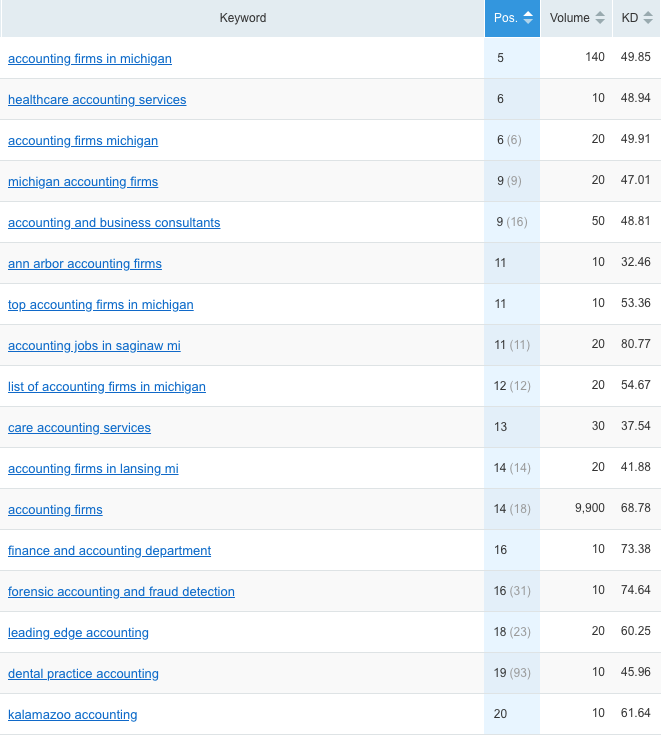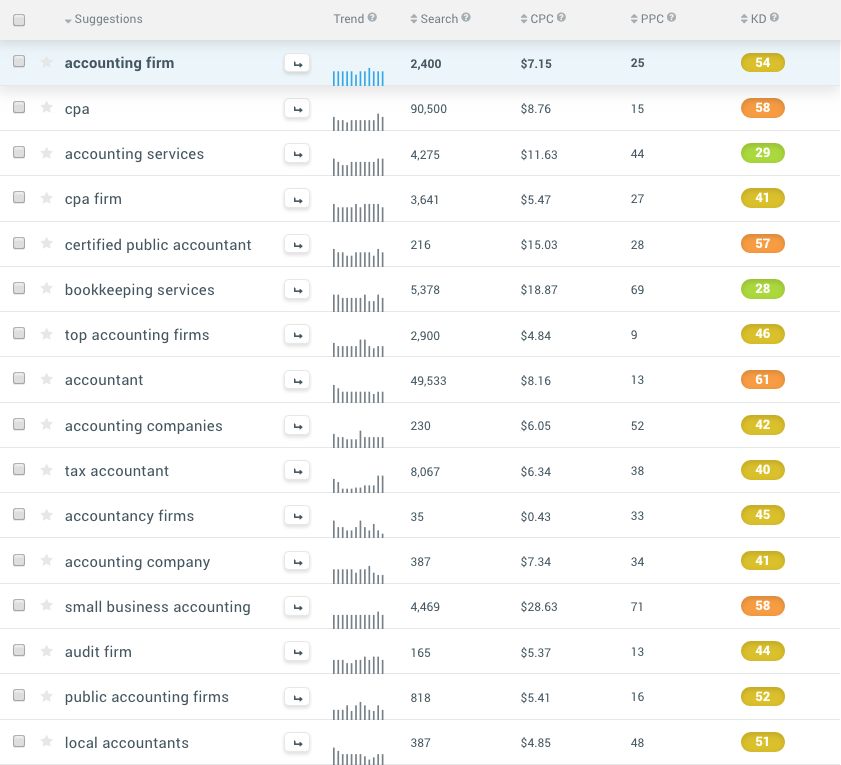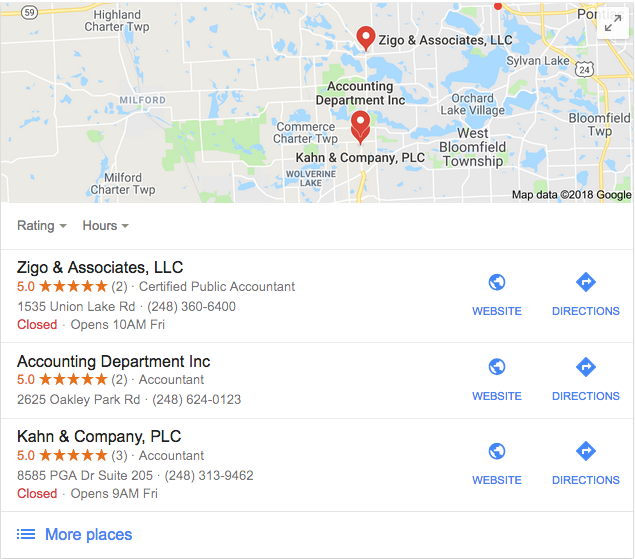Just like traditional businesses, accountants and CPAs have many options available for promoting and growing their service revenue. One of the most vital options is search engine optimization or SEO for short.
I might be just a little bit biased since I’ve been working with SEO for fifteen years. But I am with good reason. I have experienced the benefits of SEO first hand and I know SEO can be a game-changer for an accounting practice or single accountant office.
An accounting SEO strategy is similar to that of regular SEO, although there is one important nuance to remember. Since most accountants service a local area, local search becomes critical. The importance of local SEO has grown even greater since Google has been making shifts into mobile first indexing and voice search. The world searches Google for answers and most people (over 50%) are using their smartphones to find solutions to their problems.
Today I’d like to walk you through the important elements of accounting SEO and put an emphasis on the local aspect of this marketing channel. I’ll cover what local search is and how accountants and CPA firms can use it to grow their prospect list, sales, and the ever-important bottom line.
What Local Search Means to Accountants
Local search refers to an individual accessing Google to find a website that is within their geographic area. This could be a city, county, or state. The difference is the search intent is not a national based search. In these scenarios, the user wants and expects results related to their physical location.
There are four types of local searches results that occur within Google’s search engine results page (SERPs):
- The User Searches for Keyword Only – Keywords without a city name rely more heavily on traditional organic ranking factors, although in some cases they can still include local results. Examples of this would be an accounting office or divorce attorney. These types of searches are shifting more and more to a locally focused list of results.
- The User Searches for Keyword + Location – Keywords that include a city name rely more heavily on true local ranking factors and will most likely pull from local listings like Google My Business. An example of this would be Michigan CPA spots or Detroit accountant.
- Near Me Searches – In this situation, the user starts to type a phrase Google assumes is local and Google will suggest the addition of near me. When the user accepts, Google returns local results based on the user’s physical location. An example of this is the search for accountant. Google suggests adding near me to it and the search now becomes accountant near me.
- Mobile Based Searches – Keyword searches performed on mobile devices can produce very different results than that of desktop computers. A desktop and a mobile phone search can have completely different results for the exact same phrase which confuses and frustrates a lot of marketers. Such search inquiries and results can occur with or without a geographical phrase added to the search term.
Regardless of the type of search, local search dominates the results and accountants want to be on this list. To be here, accounting SEO needs to be a priority and it needs to include a focus on local.
How to Find Great Keywords
If you want to win at accounting SEO and local search, you have to start with keywords. These are the phrases people search for to find answers to their problems. If I’ve learned anything over the last fifteen years it’s this – you don’t know what the average Joe searches for online. You may think you know, but really you don’t. You have to use tools to help you find the right phrases to target.
My favorite tools for finding great keywords are KW Finder and SEMrush. As an SEO consultant, I use these daily and I couldn’t live without them. Here is why I love them.
SEO Tool #1: SEMrush
This tool will allow me to data-mine my website or that of my competitors. I can look up any local accounting firm and find out exactly what keywords they are ranking for, what keywords they are using for advertising in PPC (pay per click), and I can even see their top website content.

SEMrush: Local Accounting Terms
SEO Tools #2: KW Finder
In this tool, I can put in one phrase and receive hundreds of alternate or similar search terms. I’ll see monthly search volumes, the difficulty level, and even who is ranking on page one of Google. It’s a great tool for building a comprehensive list of keywords.

KW Finder: Keyword Options for Accounting Firm SEO
As you can see, there is a lot of great information available for helping accounting firms boost their SEO efforts and expand their reach online. If you are looking for some good data for your accounting SEO efforts, I encourage you to review KW Finder and SEMrush.
What Matters in Local Search
As I said above, local SEO has a few more nuances than regular SEO. This is because Google will take into account additional ranking factors in deciding who to place on page one of the search engine results page.
Here are the ranking factors you need to think about:
- Website Optimization – The presence of NAP (name, address and phone number) contact information on the website is absolutely critical. This information should be placed in the header or footer so it displays on all content pages and posts. When doing this, it is important to use a phone number that includes a local area code so the search engines can associate this area code with a given website’s local area.
- Structured Data – Structured data is more advanced coding that is applied to a website. It uses Schema properties and it helps search engines better understand a website and view it more like a human. The use and importance of Structured Data are growing rapidly with Google. If you use WordPress, there are a number of plugins that can help implement Structured Data at the local level.
- Inbound Links to the Website – The web is made up of content and links. Local SEO relies on these links to rank in search. You need both a good quantity of links coming from quality websites.
- Google My Business Profile – This social media profile must have accurate, have optimized categories, and relevant keywords in business description.
- External Directory References – The availability and consistency of NAP (name, address, phone number) on other third-party local business directories is also important. Example business directories for local searches would include Yelp, Angie’s List, Manta, Foursquare, Merchant Circle, TripAdvisor, and Internet Yellow Pages.
- User Behavioral & Mobile Usage – User behavioral and mobile usage are also considerations. Examples of such factors include user click-through rates from search, check-ins, and user calls to a business via search.
- Search Personalization – Search personalization includes results provided to users based on what is most relevant to their interests or located closest to their physical location.
- Reviews – The quantity and diversity of online reviews and rankings will also influence local search optimization efforts. These user reviews would be positive reviews from real users on legitimate websites.
How to Improve Your Search Results
Local SEO does not require you to insert your location throughout your content. That is old school SEO and just wrong in today’s world of search. Today’s local search optimization focuses more on accuracy and outreach.
Here are the steps you actually need to do to rank in search:
- Add your address and phone number in the footer or header of your website so Google can associate your individual content pieces with your local area.
- Use your local area code and not just an 800.
- Sign up for a Google My Business account.
- Use other social media where applicable. Facebook is always good for local SEO.
- Encourage your clients and customers to check-in and leave reviews on Google and Facebook.
- Use a consistent format for your address and information.
- Use keywords within your business descriptions.
- Check your existing listings to see if they are accurate. You can use Moz Local for this task.
- Add your business to other local directories.
Common Mistakes in Accounting SEO
Mistakes happen because website owners and marketers are only human. That said, it is important to limit such mistakes as they will reduce your local search optimization efforts.
Here are some very common user mistakes that hamper local SEO for accountants and CPAs:
- Online business listings different than the actual physical address of the business
- Duplicate listings exist in local search directories
- Inconsistencies with the business name, address, or phone number (NAP) in online directories
- Incorrect categories used in local directories such as Google My Business
- Unverified listings in local directories
These common mistakes are easy to prevent and/or fix. Knowing what matters is the biggest advantage in correcting or avoiding the issues.
It’s Time to Dig into Local SEO!
You’ve been given a lot of information but you are now empowered to rock search, improve your search ranking, and bring in more business leads. While SEO is just one marketing channel available to accountants, I believe it is an important one.
I’ve been a long believer in the fact that anyone can learn SEO. It’s not a matter of it being possible to learn SEO, it’s just a question of whether or not you want to dig in and get your hands dirty. I’m hoping you do because I know the benefits it brings to small businesses.




